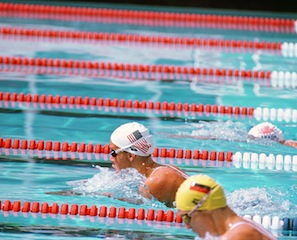Structured interview: Placebo in sports
 The following is a sample Paper 3 that looks at structured interviews. Below you will first find the stimulus piece, followed by the static questions. A copy of the mock paper is included to give students as an in-class assessment.
The following is a sample Paper 3 that looks at structured interviews. Below you will first find the stimulus piece, followed by the static questions. A copy of the mock paper is included to give students as an in-class assessment.
Potential answers are included in the hidden boxes below.
Stimulus piece
The placebo effect has been a common topic of investigation in sports psychology. For example, athletes were led to believe that they had received anabolic steroids, carbohydrates or caffeine and consequently performed better than baseline or control groups. The focus in placebo research in sport is on the role of belief as a psychological factor in performance. Sports psychologists have argued that many technologies, products or substances which seem to have an effect on athletes’ performance have no clear biological basis but may simply be the result of the placebo effect.
The aim of this qualitative study was to investigate athletes’ experience of placebo effects in competition. The three researchers were all sports psychologists and had all previously been professional athletes. The snowball sample consisted of 7 American males and 7 females (N=14) from different sports. Each participant received a brief description of the placebo effect.
The researchers used structured interviews to collect data. All participants were asked (1) if they believed that performance could be influenced by the placebo effect or by similar false beliefs and (2) if they had ever experienced a moment in sport in which a false belief affected their performance.
A little more than half of the participants said they believed that the placebo effect had influenced their performance. They could recall an event in which a form of placebo effect or false belief had positively influenced their performance. An analysis of their responses identified factors such as rituals (for example, shaving one’s legs before a swimming competition), false beliefs based on receiving a substance (for example, receiving a drug that one believes can enhance performance) or false beliefs based on misperception (for example, a coach saying: You have already done this so you can do it again).
For example, a weightlifter explained that he was fooling himself into believing that he was lifting less on the bench-press and that this helped him to a better performance. The participants all pointed to the important factor of expectations in performance. The belief in the efficacy of a substance, training procedures or rituals was seen as the most important factor in the placebo effect. Many of the participants said they believed that performance could be manipulated by the placebo effect.
The researchers concluded that the power of belief ought to be taken into consideration when preparing athletes for competition. They suggest that the placebo effect could perhaps interact with the biological system to increase performance in a natural way but that more research is needed.
Based on Beedie, C.J. Placebo effects in competitive sports: Qualitative data. Journal of Sports, Science and Medicine (2007), 6, 21-28.
Questions
1a. Identify the method used and outline two characteristics of the method.
1b. Describe the sampling method used in the study.
1c. Suggest an alternative research method giving one reason for your choice.
2. Describe the ethical considerations that were applied in the study and explain if further ethical considerations could be applied.
3. Discuss the possibility of generalizing/transferring the findings of the study.

 IB Docs (2) Team
IB Docs (2) Team
